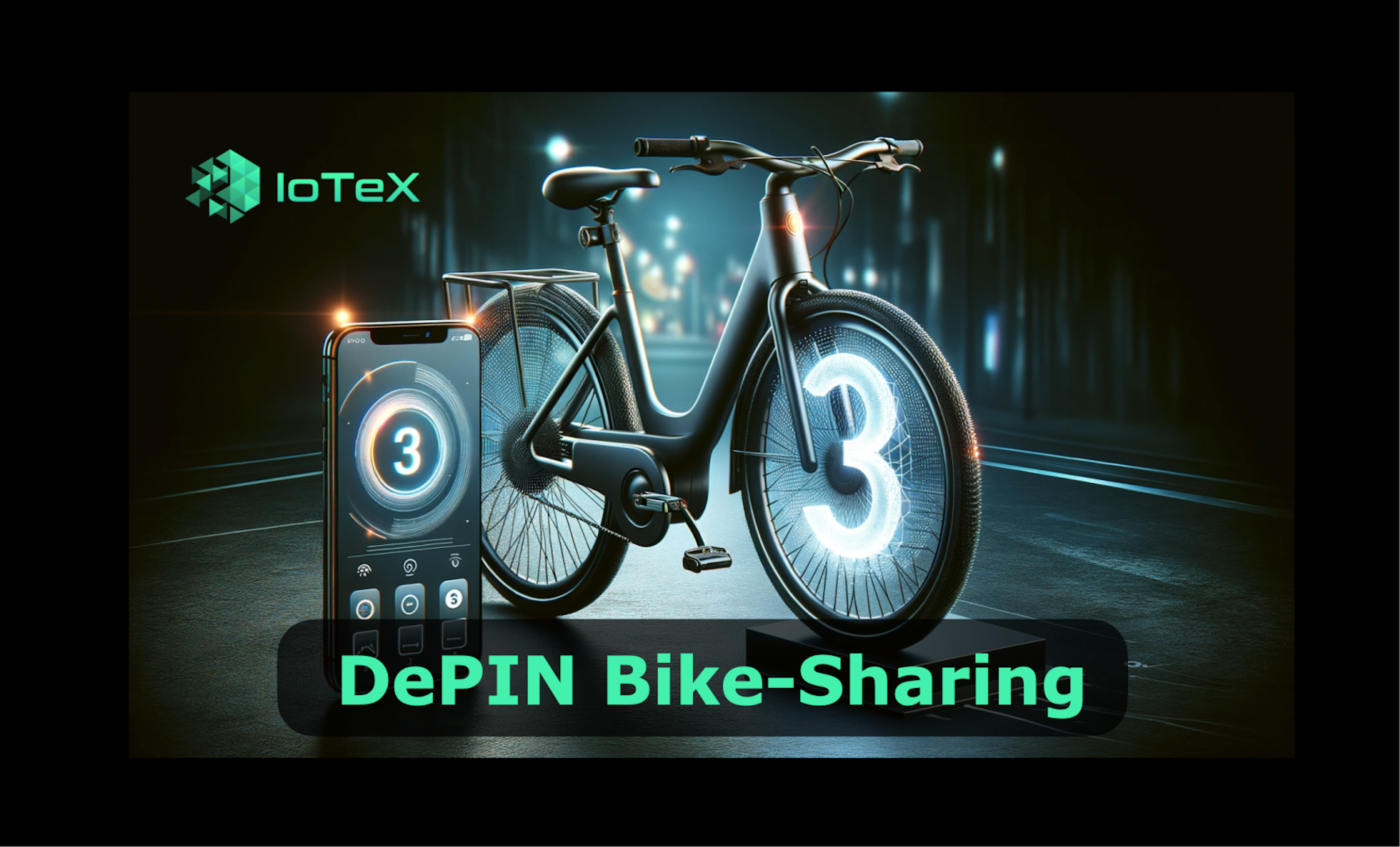tutorialwip
A decentralized Bike Sharing project | Part 3
Creating a successful DePIN token-economy model in our application.

Instructions
Reference Links:
Episode #3
In this third episode of the series, we pick up where we left off last time, continuing our work in the `blockchain` directory:
Step 1: Update the `Token.sol` Contract
There are two updates here:
- We're changing the name of the contract from a generic `Token.sol` to `BikeCalories.sol`.
- We'll be modifying the constructor to pre-mint an initial supply of our `BCAL` token, and implement a `_transfer()` to allocate 50% of the total supply to the deployer of the contract, which could be the DAO managing this DePIN project for example. This is done with the purpose of allocating a certain portion of the token for airdrop, dev team, partnerships, etc...
The full `BikeCalories.sol` contract will now look like this:
```solidity
// SPDX-License-Identifier: MIT
pragma solidity ^0.8.17;
import "@openzeppelin/contracts/token/ERC20/ERC20.sol";
import "@openzeppelin/contracts/access/AccessControl.sol";
contract BikeCalories is ERC20, AccessControl {
bytes32 public constant MINTER_ROLE = keccak256("MINTER_ROLE");
bytes32 public constant BURNER_ROLE = keccak256("BURNER_ROLE");
// The project DAO will be the only minter
modifier onlyMinter() {
require(hasRole(MINTER_ROLE, msg.sender), "Caller is not a minter");
_;
}
// The project dApp contract will be the only burner
modifier onlyBurner() {
require(hasRole(BURNER_ROLE, msg.sender), "Caller is not a burner");
_;
}
constructor() ERC20("Bike Calories", "BCAL") {
// We mint an initial supply of 1B tokens to the token contract
_mint(address(this), 1000000000 * 18**decimals());
// We transfer 50% to the deployer to allocate a certain portion
// for airdrops, team members, partnerships, and ecosystem development
_transfer(address(this), msg.sender, 500000000 * 18**decimals());
// After the bootstrap phase, the deployer should be removed as admin
_setupRole(DEFAULT_ADMIN_ROLE, msg.sender);
}
// Apart from the staking contract, that needt to mint rewards,
// the only other contract that can mint tokens is the DAO
function mint(address to, uint256 amount) public onlyMinter {
_mint(to, amount);
}
// The dApp will burn tokens when users rent a bike
function burn(address from, uint256 amount) public onlyBurner {
_burn(from, amount);
}
}
```
Step 2: Create the `BikeSharing.sol` Contract
This is the main BikeSharing dApp contract that manages rides, payments and the token economy:
```solidity
// SPDX-License-Identifier: MIT
pragma solidity ^0.8.17;
// Import ERC20 from Openzeppelin to manage ioUSDT and CAL tokens
import "@openzeppelin/contracts/token/ERC20/ERC20.sol";
// Import ERC721 from Openzeppelin to check the Bike NFTs ownership
import "@openzeppelin/contracts/token/ERC721/ERC721.sol";
// Import the ZK-Proof verifier contract
import "./IVerifier.sol";
/*
* This is the main BikeSharing dApp contract that manages rides, payments,
* and the token economy
*/
contract Bikesharing {
// These values define the cost of renting a bike
// and they can be changed by the DAOP
const WEIGHT_DISTANCE = 1000; // Pay 1 ioUSDT every 1km
const WEIGHT_DURATION = 2000; // Pay 1 ioUSDT every 8 minutes (roughly)
// Store the Bikes NFT token address
ERC721 public bikesAddress;
// Store the Bike Calories token address
ERC20 public caloriesAddress;
// Store the ioUSDT token address
ERC20 public usdtAddress;
// Store the ZK-Proof verifier contract address
IVerifier public verifierAddress;
// Keeps tracks of the amount of ioUSDT deposited by each user
mapping(address => uint256) public deposits;
// Keeps track of the ongoing rides by bikeId
mapping(uint256 => address) public rides;
// Constructor
constructor(address _bikesAddress,
address _caloriesAddress,
address _usdtAddress,
address _verifierAddress) {
bikesAddress = ERC721(_bikesAddress);
caloriesAddress = ERC20(_caloriesAddress);
usdtAddress = ERC20(_usdtAddress);
verifierAddress = IVerifier(_verifierAddress);
}
// For a user to rent a bike, they should have deposited the minimum
// amount of ioUSDT tokens required by the bike owner to ensure
// responsible usage of the bikes
function deposit(uint256 amount) public {
// Transfer the ioUSDT tokens from the user to the contract
usdtAddress.transferFrom(msg.sender, address(this), amount);
// Take note of the amount deposited by the user
deposits[msg.sender] += amount;
}
// Allow a user to start renting a bike. We assume that the bike is
// smart enough to check how much the user has deposited, subtract
// the security deposit, and estimate how long they can ride to stop
// the bike when the time is up
function unlockBike(uint256 bikeId) public {
// Make sure the bike is not already rented
require(rides[bikeId] == address(0), "Bike is already rented");
// Check that the user has deposited enough ioUSDT to rent the bike
// For simplicity, we assume 250 ioUSDT, but this could be
// defined by the bike owner
uint256 minDeposit = 250 * 6 * decimals();
// Minimum ride cost is 1km + 8 minutes
uint256 minRideCost = calculateRideCost(1 * 1000, 8 * 60);
require(deposits[msg.sender] >= minDeposit, "Not enough ioUSDT deposited to rent this bike");
// Check that the remaining deposit is enough to cover for a minimum ride
require(deposits[msg.sender] - minDeposit >= minRideCost, "Not enough ioUSDT to cover for a minimum ride");
// Store the ride id by bike id
rides[bikeId] = msg.sender;
}
// This function receives a ZK-Proof that the a ride was completed
// with some distance and duration. The proof is verified by the
// dedicated verifier contract. Upon proof verification, the
// contract retrieves the owner of the bike from the NFT contract
// and transfers the 75% of the ride cost from the user to the bike owner.abi
function lockBike(bytes memory zkProof,
uint256 bikeId, uint256 distance, uint256 duration ) public {
// Verify the zk proof
bool isValid = verifierAddress.verify(zkProof, bikeId, distance, duration);
require(isValid, "Invalid zk proof");
// Calculate the ride cost
uint256 rideCost = calculateRideCost(distance, duration);
// Calculate the amount to be transferred to the bike owner
uint256 ownerAmount = rideCost * 75 / 100;
// Retrieve the bike owner from the NFT contract
address bikeOwner = bikesAddress.ownerOf(bikeId);
// Transfer the ride cost to the bike owner
usdtAddress.transferFrom(msg.sender, bikeOwner, ownerAmount);
// Close the ride
rides[bikeId] = address(0);
}
// This function calculates the cost of a ride based on kms ridden
// and the time of the ride in seconds
function calculateRideCost(uint256 distance, uint256 duration) public pure returns (uint256) {
return distance * WEIGHT_DISTANCE + duration * WEIGHT_DURATION;
}
}
```